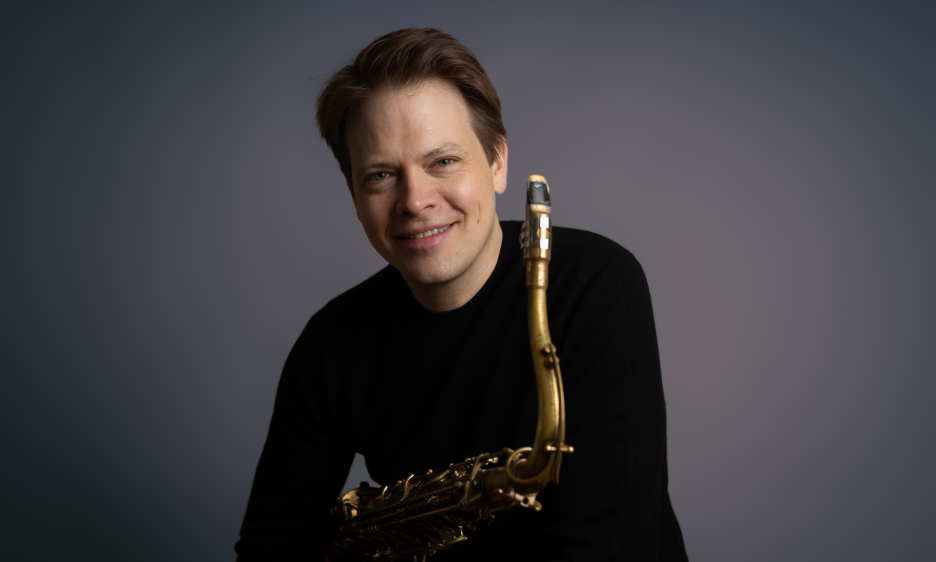Home » Jazz Articles » Catching Up With » Denis Gäbel: A Deeper Meaning
Denis Gäbel: A Deeper Meaning

Courtesy Frank Sackenheim
Playing in the hr-Bigband also gives me more time to look at individual details, which isn’t possible when you’re only together for a limited time. That lets me give each phrase a deeper meaning.
Denis Gäbel grew up in a showbiz family. His brother Colin is a TV presenter and his brother Tom is a singer—but it was his saxophone-playing mother who inspired him to try a reed instrument. He went on to study with teachers such as Dick Oatts and Jasper Blom at the Conservatorium van Amsterdam, and also spent time at the Manhattan School of Music. In 2016, his quartet was a finalist for the prestigious Neuer Deutscher Jazzpreis. He has released five records as a band leader and joined the hr-Bigband (also known as the Frankfurt Radio Big Band) in February 2022.
Here's what he had to say during the interview with All About Jazz:
All About Jazz: How do you feel about joining the hr-Bigband?
Denis Gäbel: I feel great! I've been following big bands since my teenage years, and there's something special about big German radio bands like the hr-Bigband. Musicians get the chance to develop a really strong connection because they work together every week, not just for one recording session or concert. I already knew a few band members from the freelance scene—like Jean Paul Höchstädter, Oliver Leicht and Günter Bollmann. And if these guys were playing, I knew it would be a great experience. They're humble people and always a pleasure to work with.
There's something different almost every week and that way of working is still quite new for me, but I'm getting to play with a lot of amazing feature artists. Recently, we performed with the great Cuban pianist Roberto Fonseca, for example. I went deep into those Cuban rhythms and ideas for a while, and then we were doing something totally different the next week. You really learn a lot, and you have to learn fast and be very dedicated. But it's so much fun!
Playing in the hr-Bigband also gives me more time to look at individual details, which isn't possible when you're only together for a limited time. That lets me give each phrase a deeper meaning. It's an emotional thing, but it's also very concrete. Nothing gets lost. And after a while, you know exactly how the other musicians are going to play without talking about it.
AAJ: What do you enjoy about playing in a big band setting?
DG: Playing in big bands feels completely natural for me because I've been listening to this music since I was very young. The sound of a big band is such a central part of jazz and there's a huge repertoire for big bands. Of course, I love standing up front and playing solos too, but it's very satisfying to blend with other musicians and create that sound together.
When I want to enjoy some music at home, I most often put on something fairly old. When you listen to Count Basie or Duke Ellington, you're listening to an important root of jazz—a lot of music grows from there. Those old bands played together for many years, and you can really hear that familiarity in the little effects and the way the musicians blend their instruments together. Working in a radio big band gives you a little bit of that touch. There are moments when I think, "Ah, that's the sound from those old recordings." It's nice to feel like part of that tradition.
AAJ: What's on this year's agenda for the hr-Bigband?
DG: This year's agenda is full! When I joined the big band in February, we had to cancel a few projects because of the pandemic. Thankfully, we're back to a normal program now. We're playing arrangements from West Side Story with Nils Landgren in July, then we're working with Wolfgang Haffner... There's a lot of great stuff coming up, and some of our performances are streamed live too.
AAJ: And what other projects are you working on?
DG: I've got two albums coming out for other projects this year.
First, the Denis Gäbel Trio is releasing The Mingus Sessions on June 24. It features Robert Landfermann on bass and Leif Berger on drums, plus several wonderful guests who bring different colors and ideas. I feel very connected to the music of Charles Mingus because I listened to it at a young age. Everybody has music they listen to at a certain time in their life, some they listen to maybe once a year, and other music they can listen to anytime. Mingus is very high on that list for me. I love the raw energy, with one foot in the blues and then a slightly free-jazz vibe. It's not too clean, but it can also be beautiful too.
I wanted to make an album of his music with a more open approach and the 100-year anniversary of Mingus' birth gave us an opportunity. We just invited a few people to play with us and see what happened. I liked having the trio as a basis and then having the guests to bring in something new.
The second album coming out this year is The Good Spirits—Part 2 by the Denis Gäbel Quartet, which we're releasing in October. It follows an album from 2018, where I brought together some of my favorite musicians from New York City. I had very specific ideas about where the songs should go for that album, and the arrangements were much longer. This time, I reduced the compositions to just a few ideas and wanted to see what happened when we played them together.
This new album features Sebastian Sternal on piano, Reuben Rogers on bass and Clarence Penn on drums. I composed directly for this group of musicians, and I was amazed by their dedication to the music. They are very focused and serious, but also open and relaxed when we play. We had almost everything done in a couple of hours. It was a great process to let go of my own ideas, be in the moment and see what these good spirits produce.
The name of the album is about positivity and good vibes, because I love people who have a certain aura that is productive and encouraging, uplifting and intelligent. The guys in this band are good people to be around. I'm excited about touring with them in October and November this year.
< Previous
Take Five with Anita Donndorff
Next >
Growing Roots
Comments
Tags
Interview
Denis Gäbel
Matty Bannond
Germany
Frankfurt
hr-Bigband
Nils Landgren
Camille Thurman
John Beasley
Dick Oatts
Jasper Blom
Frankfurt Radio Big Band
Paul Höchstädter
Oliver Leicht
Günter Bollmann
Roberto Fonseca
Count Basie
duke ellington
Wolfgang Haffner
Robert Landfermann
Leif Berger
Charles Mingus
Sebastian Sternal
Reuben Rogers
Clarence Penn
For the Love of Jazz
 All About Jazz has been a pillar of jazz since 1995, championing it as an art form and, more importantly, supporting the musicians who create it. Our enduring commitment has made "AAJ" one of the most culturally important websites of its kind, read by hundreds of thousands of fans, musicians and industry figures every month.
All About Jazz has been a pillar of jazz since 1995, championing it as an art form and, more importantly, supporting the musicians who create it. Our enduring commitment has made "AAJ" one of the most culturally important websites of its kind, read by hundreds of thousands of fans, musicians and industry figures every month.
























